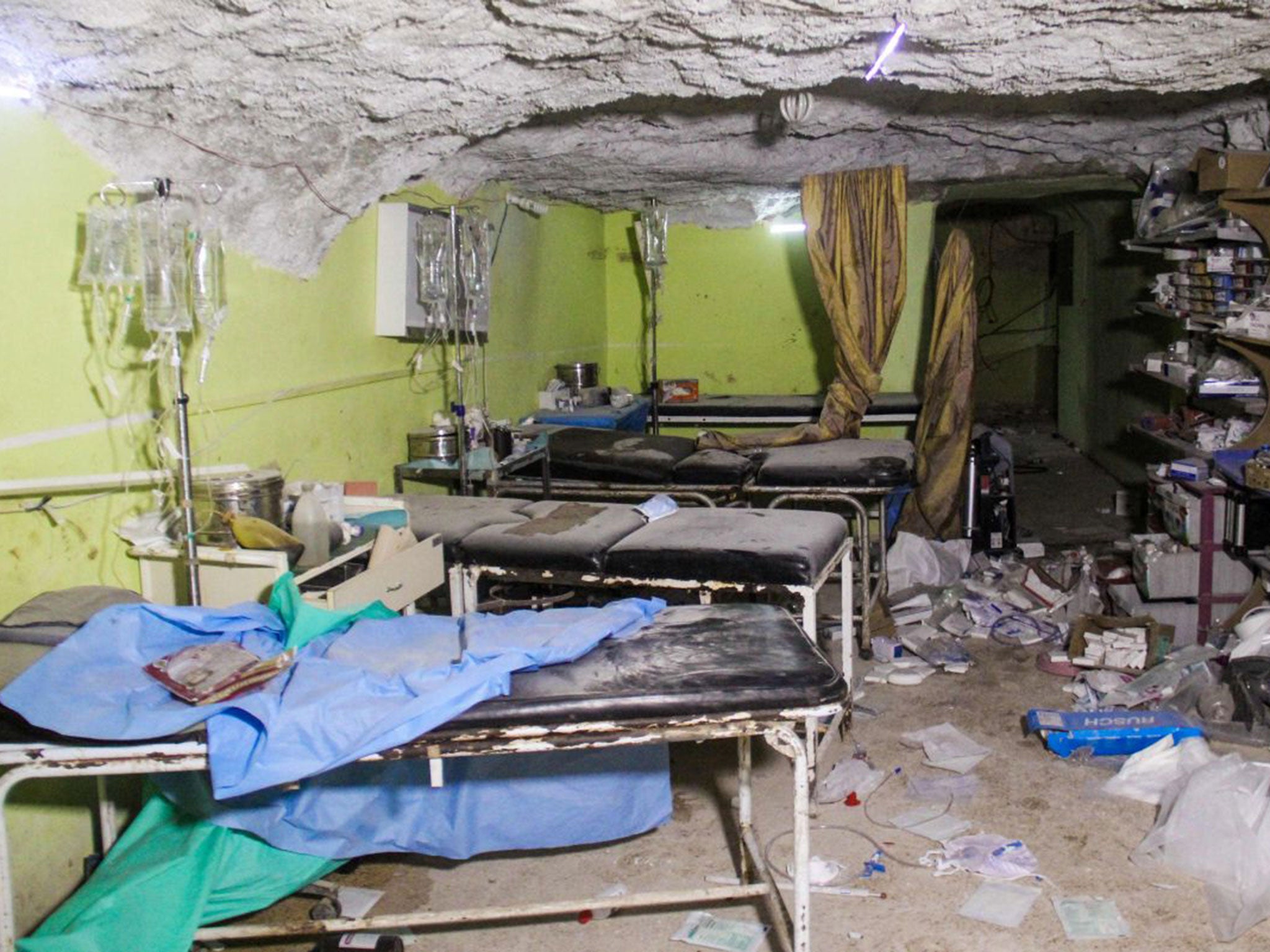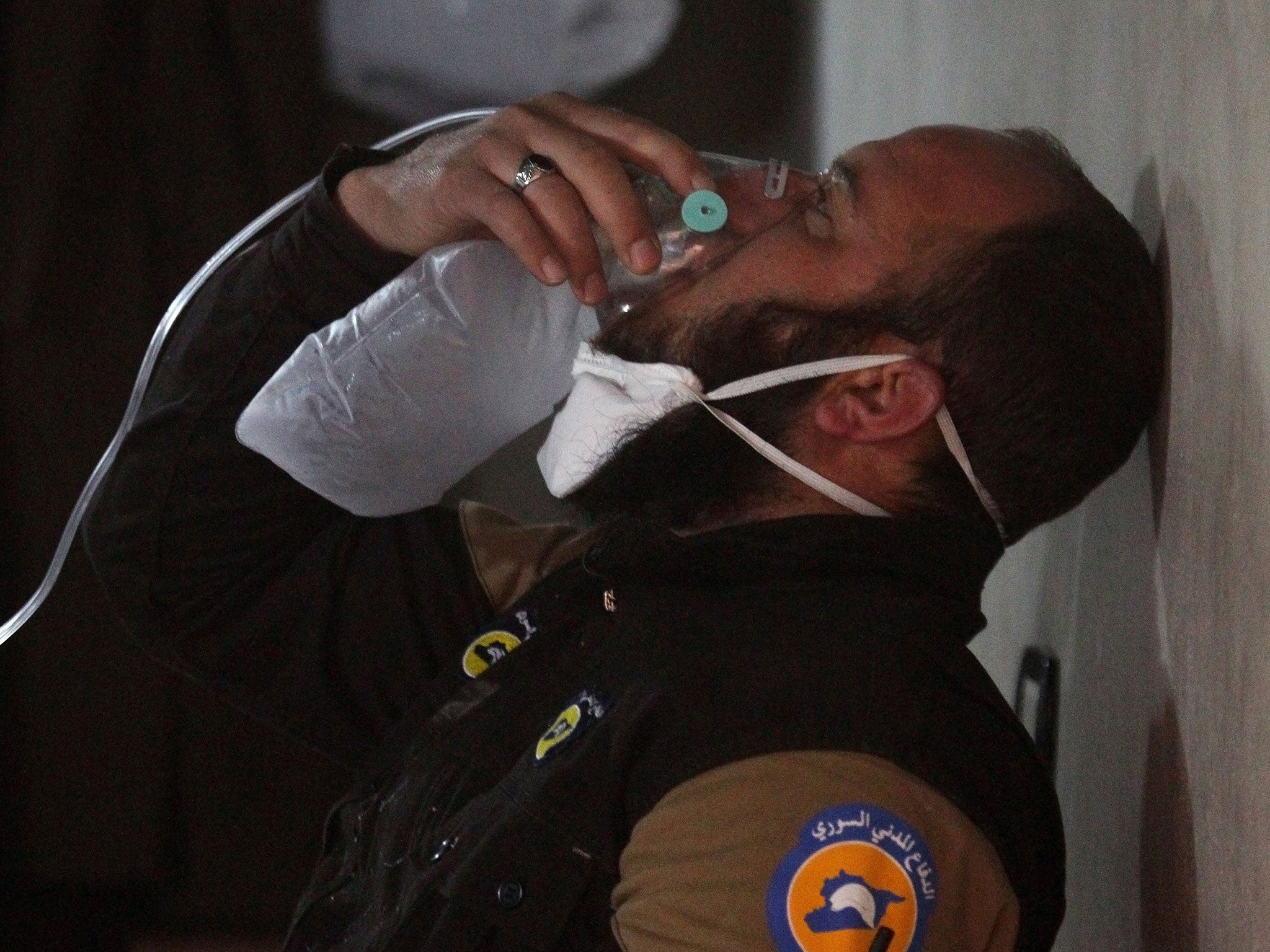Syria chemical attack: Bombing continues in Idlib as Assad regime denies killing 72 people with toxic gas
International tensions rising as world leaders gather at Brussels conference on Syria
Your support helps us to tell the story
From reproductive rights to climate change to Big Tech, The Independent is on the ground when the story is developing. Whether it's investigating the financials of Elon Musk's pro-Trump PAC or producing our latest documentary, 'The A Word', which shines a light on the American women fighting for reproductive rights, we know how important it is to parse out the facts from the messaging.
At such a critical moment in US history, we need reporters on the ground. Your donation allows us to keep sending journalists to speak to both sides of the story.
The Independent is trusted by Americans across the entire political spectrum. And unlike many other quality news outlets, we choose not to lock Americans out of our reporting and analysis with paywalls. We believe quality journalism should be available to everyone, paid for by those who can afford it.
Your support makes all the difference.Warplanes were bombing a rebel-held town in Syria for a second day amid increasing international tensions over an apparent chemical attack that killed more than 70 people.
Bashar al-Assad’s government has categorically denied using poisonous gases in Khan Sheikhoun or possessing the banned munitions, while his ally Russia claimed Syrian jets conducting legitimate strikes had struck a rebel weapons facility.
Major General Igor Konashenkov, from the Russian defence ministry, claimed a destroyed warehouse was used to produce and store shells containing toxic gas to be sent to Iraq.
The statement carried by Russian state media cited no evidence for the claim, which was also made over alleged chemical attacks in Aleppo, but said the information was “fully objective and verified”.
Hasan Haj Ali, commander of the Free Idlib Army rebel group, called the Russian statement a “lie”.
“Everyone saw the plane while it was bombing with gas,” he told Reuters.
“Likewise, all the civilians in the area know that there are no military positions there, or places for the manufacture [of weapons]. The various factions of the opposition are not capable of producing these substances.”
The UK-based Syrian Observatory for Human Rights said at least 72 people were killed on what has been dubbed “Black Tuesday” in Idlib province.
It said 20 children and 17 women were among dead civilians in Khan Sheikhoun, killed by “gases that caused suffocation” and other symptoms doctors said pointed to the use of sarin.

The Observatory said many victims remained in hospital on Wednesday morning, when at least five new air strikes were carried out. There was no immediate information on casualties.
United Nations war crimes investigators have launched a probe into both the alleged chemical attack and subsequent bombardment that hit hospitals, saying the use of chemical weapons or deliberate targeting of medical facilities “would amount to war crimes and serious violations of human rights law”.
Events in Khan Sheikhoun were expected to dominate a major international conference being co-hosted by the UK in Brussels on “supporting the future of Syria and the region”.
Boris Johnson said all evidence so far “suggests this was the Assad regime who did it in the full knowledge that they were using illegal weapons in a barbaric attack on their own people”, adding that he ”would like to see those culpable pay a price for this”.
The UN’s special envoy to Syria said an emergency Security Council meeting would be held, while investigations continue into what appeared to be a “chemical attack from the air”.
Donald Trump’s spokesman condemned “heinous actions by the Assad regime”, blaming the attack on the Obama administration, while US Secretary of State said it was “clear that this is how Bashar al-Assad operates: with brutal, unabashed barbarism”.
Rex Tillerson called for Assad’s allies in Russia and Iran to exercise their influence to work towards a genuine ceasefire, accusing them of bearing “great moral responsibility” for the deaths.
French President François Hollande said Assad was counting “on the complicity of his allies to benefit from intolerable impunity”, predicting that the regime would deny evidence of its responsibility.
Pope Francis said he was horrified by the “unacceptable massacre” of innocent civilians, telling tens of thousands of people in St Peter's Square he was praying for “the defenceless victims, including many children.”
The Catholic leader appealed to “the consciences of those who hold political power, both at the local and international levels so that these tragedies end.”
The government-controlled Syrian Arab News Agency (Sana) carried a denial from the country’s foreign ministry claiming the Syrian Arab Army does not possess “any form of chemical weapons”.
An anonymous source blamed “armed terrorist groups” for the attack in Khan Sheikhoun, adding: “As usual and since four years, those sides have fabricated fake accusations against the armed forces in the Syrian Arab Republic.”
A statement claimed the “campaign” was revenge for military gains by the regime and aimed to “justify hostile resolutions” it expects to be adopted at the Brussels conference.
But the Syrian opposition said the massacre was a “direct consequence” of statements by Mr Tillerson and Mr Trump’s UN ambassador Nikki Haley suggesting the removal of Assad was not a priority, while foreign politicians suggested the new US administration was being “tested”.
The Organisation for the Prohibition of Chemical Weapons (OPCW) said it was “seriously concerned” about reports emerging from Khan Sheikhoun and was gathering evidence, following “persistent allegations” of illegal chemical weapons use in Syria.
Doctors said victims started to choke, vomit and faint with foam coming out of their mouths, showing symptoms of possible sarin gas exposure.
Pin-point pupils and a lack of the odour associated with more commonly used chlorine gas were among the evidence cited for the nerve agent, which is banned as a weapon of mass destruction under international law.
Graphic footage showed convulsing and choking patients being doused with water and loaded into ambulances, with the bodies of around a dozen young children seen being laid out on blankets in a flat-bed truck.
Hours afterwards, clinics treating the victims were themselves hit by suspected rocket attacks from fighter jets.

If confirmed, the incident would be the deadliest chemical attack in Syria since rockets containing sarin gas killed hundreds of civilians in Ghouta in August 2013, almost sparking British military intervention.
Following the attack, Syria joined the international Chemical Weapons Convention under a US-Russian deal, averting the threat of American intervention to overthrow Assad.
Under the deal, Syria agreed to give up its chemical arsenal and surrendered 1,300 tonnes of toxic weapons and industrial chemicals to the international community for destruction.
But UN-OPCW investigators found the regime has continued to use chlorine, which is widely available and hard to trace, in barrel bombs dropped from helicopters.
A report by the released last year concluded that Syrian government forces were responsible for three examined chemical attacks but China and Russia have vetoed sanctions.
At least 53 people were killed in a similar suspected chemical incident in the Isis-controlled town of Uqayribat in December but the attack received little international attention.
Khan Sheikhoun sits near the frontline between regime and opposition-held territory, on a strategic motorway linking the city of Hama with rebel strongholds to the north.
Idlib province, in north-western Syria, is a key battleground between regime forces and rebels including an alliance of Islamist factions linked to al-Qaeda.
It was the destination for rebel fighters evacuated from eastern Aleppo earlier this year, and is widely expected to be Assad's next major target.
Successive rounds of peace talks in Geneva and Astana have so far failed to produce a lasting ceasefire in the Syrian conflict, which shows no sign of ending in its seventh year of bloodshed.

Join our commenting forum
Join thought-provoking conversations, follow other Independent readers and see their replies
Comments